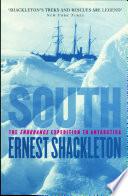Works

South
Ernest ShackletonFamous Ernest Shackleton Quotes
“Difficulties are just things to overcome after all.”
Quoted in Shackleton (2013) by Roland Huntford https://books.google.cl/books?id=U6MNkTbRwtwC&pg=PT250&lpg=PT250&dq=Difficulties+are+just+things+to+overcome+after+all&source=bl&ots=3gWt7QcL43&sig=y5CzkBvxAdWC7MlWA3eP1eNkpDs&hl=en&sa=X&redir_esc=y#v=onepage&q=Difficulties%20are%20just%20things%20to%20overcome%20after%20all&f=false
The first published appearance of this "ad" is on the first page of a 1949 book by Julian Lewis Watkins, The 100 Greatest Advertisements: Who Wrote Them and What They Did. (Moore Publishing Company), except with the Americanized word "honor", rather than "honour".
Heart of the Antarctic (22 November 1908)
“Better a live donkey than a dead lion.”
Quoted in [Moss, Stephen, Captain Scott centenary: Storm rages around polar explorer's reputation, The Guardian, 28 March 2012, http://www.theguardian.com/uk/2012/mar/28/captain-scott-antarctic-centenary-profile]
Ernest Shackleton Quotes
“The difficulties of the journey lay behind us.”
Ch 10 : Across South Georgia
South (1920)
Context: The difficulties of the journey lay behind us. We tried to straighten ourselves up a bit, for the thought that there might be women at the station made us painfully conscious of our uncivilized appearance. Our beards were long and our hair was matted. We were unwashed and the garments that we had worn for nearly a year without a change were tattered and stained. Three more unpleasant-looking ruffians could hardly have been imagined. Worsley produced several safety-pins from some corner of his garments and effected some temporary repairs that really emphasized his general disrepair. Down we hurried, and when quite close to the station we met two small boys ten or twelve years of age. I asked these lads where the manager's house was situated. They did not answer. They gave us one look — a comprehensive look that did not need to be repeated. Then they ran from us as fast as their legs would carry them. We reached the outskirts of the station and passed through the " digesting-house," which was dark inside. Emerging at the other end, we met an old man, who started as if he had seen the Devil himself and gave us no time to ask any question. He hurried away.
Ch 10 : Across South Georgia; in this extract, Shackleton was paraphrasing the poem "The Call of the Wild" by Robert Service, published in 1907.
South (1920)
Context: At the bottom of the fall we were able to stand again on dry land. The rope could not be recovered. We had flung down the adze from the top of the fall and also the logbook and the cooker wrapped in one of our blouses. That was all, except our wet clothes, that we brought out of the Antarctic, which we had entered a year and a half before with well-found ship, full equipment, and high hopes. That was all of tangible things; but in memories we were rich. We had pierced the veneer of outside things. We had "suffered, starved and triumphed, groveled down yet grasped at glory, grown bigger in the bigness of the whole. We had seen God in His splendours, heard the text that Nature renders." We had reached the naked soul of man.
“At the bottom of the fall we were able to stand again on dry land.”
Ch 10 : Across South Georgia; in this extract, Shackleton was paraphrasing the poem "The Call of the Wild" by Robert Service, published in 1907.
South (1920)
Context: At the bottom of the fall we were able to stand again on dry land. The rope could not be recovered. We had flung down the adze from the top of the fall and also the logbook and the cooker wrapped in one of our blouses. That was all, except our wet clothes, that we brought out of the Antarctic, which we had entered a year and a half before with well-found ship, full equipment, and high hopes. That was all of tangible things; but in memories we were rich. We had pierced the veneer of outside things. We had "suffered, starved and triumphed, groveled down yet grasped at glory, grown bigger in the bigness of the whole. We had seen God in His splendours, heard the text that Nature renders." We had reached the naked soul of man.
“I have been thinking much of our prospects.”
Source: South (1920), Ch. 8 : Escape From The Ice
Context: I have been thinking much of our prospects. The appearance of Clarence Island after our long drift seems, somehow, to convey an ultimatum. The island is the last outpost of the south and our final chance of a landing-place. Beyond it lies the broad Atlantic. Our little boats may be compelled any day now to sail unsheltered over the open sea with a thousand leagues of ocean separating them from the land to the north and east. It seems vital that we shall land on Clarence Island or its neighbour, Elephant Island. The latter island has an attraction for us, although as far as I know nobody has ever landed there. Its name suggests the presence of the plump and succulent sea-elephant. We have an increasing desire in any case to get firm ground under our feet. The floe has been a good friend to us, but it is reaching the end of its journey, and it is liable at any time now to break up and fling us into the unplumbed sea.
“Optimism is true moral courage.”
Quoted in South with Shackleton (1949) by L. D. A. Hussey; also in The National Geographic Magazine (1998), Vol. 194, p. 90 https://books.google.com/books?id=RflKAAAAYAAJ&q=%22Optimism+is+true+moral+courage%22&dq=%22Optimism+is+true+moral+courage%22&hl=en&sa=X&ei=uPISVYCTK8_loAT_kYDIBw&ved=0CNABEOgBMCA
